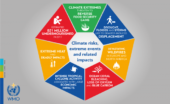Molly Minturn - My family is heartbroken to share that my father died in surgery on Monday, Feb. 10. It…
Carbonating India by Cleo Paskal
Written by Diana Thebaud Nicholson // March 18, 2008 // Cleo Paskal, Environment & Energy, India, Public Policy, Security, Trade & Tariffs, Wednesday Night Authors // Comments Off on Carbonating India by Cleo Paskal
There is now widespread scientific consensus that human-produced carbon emissions are contributing to global climate change. It may not be the only cause, and global feedback mechanisms (like the release of huge of the greenhouse gas methane from the melting permafrost) could be too far advanced to stop, but the political reality is that there is growing pressure for a global framework to curb carbon emissions.
The EU is working hard, at all levels, hoping to position itself as the world agenda-setter in carbon-related issues. They are benefiting from the US’ official absence from the international negotiations. But individual US States and cities are actively enacting their own legislation, making it very likely that, after the next US national election, the US will jump fully into the global carbon debate.
China is trying to position itself as the voice of the developing world, while at the same time trying to use the EU position to its own advantage (i.e. there is currently a proposal on the table for Germany to relax its intellectual property rights legislation in regards China so it is easier for companies like Siemens to transfer ‘carbon friendly’ technology. This is not a concession that China is looking to extend to other members of the developing world).
Meanwhile, seen from the outside, India seems to be decidedly behind in positioning itself in relations to the new realities. It is neither leading the debate, nor benefiting from the current construct.
The political component of carbon
Apart from reducing emissions, the carbon issue is also being used to advance various ancillary agenda, such as those relating to energy security, protectionism, subsidies and trade tariffs. All too often, cutting carbon emissions is used as a justification and impetus for an existing policy that, when more closely examined, gives little to no carbon cutting benefits. For example, cutting carbon emissions is being used to justify:
* A push for various biofuels, even though many, at their current stage of development, can often take as much fossil fuel, or more, to grow and process than they replace at the pump. In the US, ethanol has mostly been an excuse for more agricultural subsidies.
The shift from food crops to fuel crops has done little to promote energy security, meanwhile it has depleted valuable water reserves, put a strain on global food supply and contributed (along with extreme climate patterns) to precipitous food price inflation. In some places it is also resulting in deforestation that reduces the global carbon sink, compounding the net increase in emissions.
In Europe, where there are dwindling domestic fossil fuel supplies, ‘climate security’ is politically often closely linked with ‘energy security’. The push for alternate and renewable sources may have received its biggest political boost not from climate-related science, but from Russia showing a willingness to play politics with its fuel supply. Therefore, it makes sense from an EU point of view to encourage global policies that favour those that cut down on fossil fuel use as it reinforces the EU’s existing goal of trying to create more energy independence for security reasons.
* The increasing push to rate food/products by ‘food miles’ (or the distance the food traveled to get to the shop). In the UK, food that has been flown in is now commonly labeled with ‘By air’ tags in large grocery stores to encourage buyers to focus on local or shipped products. This is in effect morally-backed protectionism and is sometimes based on faulty logic. For example, one study has shown that the carbon footprint of cut flowers flown in from Kenya was much lower than those grown in Europe because of the fuel needed to heat the greenhouses in colder climates;
* Demonstrations against flying in general and the expansion of Heathrow Airport in particular have turned flying, especially for a holiday, into a moral issue. This is an example of how a single ‘lifestyle choice’ can be highlighted and other equally valid issues are given less focus. For example, according to a major report by Food and Agriculture Organization of the UN, the meat industry produces more greenhouse gases than the entire transportation industry, and yet a climate change link to eating less meat/vegetarianism is far less advanced than the ‘no-fly’ lobby.
At the grass-roots level, there is an enormous amount of incomplete analysis of the problem, and at the governmental level, carbon is often used to justify policies that actually have little to do with reducing emissions.
All this could have a serious effect on India. Just to use the small examples above, the faulty logic and policies of others could drive up the price of India’s food and energy imports, hamper its tourism/business development and its ability to export, and make it a net loser in the carbon counting stakes.
What to do
There is a need for a two-pronged assessment of how cutting carbon emissions will affect India.
One prong would look at, and encourage, effective procedures that would actually produce results. It would identify, and promote, policies and India-invented technologies that can help reduce the amount of greenhouses gases produced, helping to make India a world leader in solutions.
Another prong would look at what global policies are gaining momentum with a view to ‘play the system’ to India’s benefit. It is also important to try to counter policies that have no carbon cutting benefit and are harmful to Indian development while, at the same time, implement ones that may not be of direct carbon cutting benefit, but would be otherwise advantageous. For example, if other nations are tagging Indian imports with ‘food mile’ penalties, it would only make sense to consider implementing commensurate ‘carbon’ tariffs on imports from those nations (Chinese products in particular tend to have a heavy carbon footprint). Also, if it looks like the world is going globally towards labeling products with their ‘carbon footprint’, India should act to develop its own accounting system for exports so that faulty accounting in the importing country doesn’t affect India’s exports in the same way the Kenyan flower growers were affected.
Essentially a new series of levers is being introduced into international trade and, while the game must be played, it is also essential to keep in mind the ultimate goal of cutting emissions.
Conclusion
Both because of the looming, damaging, effects of climate change and because the global economy is starting to incorporate carbon-related elements (something that is almost certainly going to grow exponentially), India needs to figure out what it wants, and take control of the (ideally global) process before it is left standing at the starting gate after all the other horses have left in a blur.
C Paskal is an Associate Fellow at the Royal Institute of International Affairs, London, and Visiting Faculty in the Department of Geopolitics, Manipal University Hardnews India March 2008



